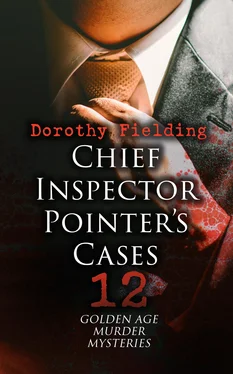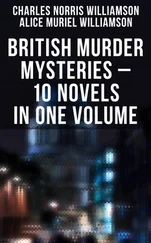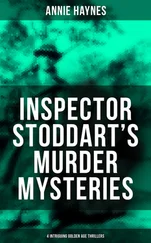Wilmot said he quite understood, and would come again at about ten.
Vardon held out his hand.
"I'm more grateful than I can say. Just at present I'm a bit stunned. You must make allowances."
They shook hands and Wilmot went back to Pointer.
The Chief Inspector sat thinking for a moment after Wilmot left him. A bell rang. He had a telephone extension which connected with Bates's instrument. Picking up that receiver, the Chief Inspector heard a voice asking for a number. A glance at the Yard's telephone directory gave him the name that fitted it as Dorset Steele, Solicitor, Bedford Row.
"Mr. Dorset Steele wanted on the telephone at once, please. No name," the voice went on. There was a pause. Then Pointer heard a gruff: "Well? Well? What is it? What is it?"
"Can you come and see me? You recognise the voice, don't you?"
"I do. Well? Well?" snapped the solicitor.
"I'm in a quandary. I can't come myself, but I'd like to see you as soon as possible," Vardon gave his address.
"Coming at once," barked Dorset Steele, and hung up. Apparently Vardon was not the apple of the legal man's eye, yet in a very few minutes, Bates showed Dorset Steele up. A tall, thin, rather untidy looking man who carried his head a foot in advance of his rounded shoulders. The "lost golf-ball" look, Barbara Ash called it.
"Now, what's wrong?" he snapped by way of greeting, looking at the young man under his eyebrows like an old poodle of uncertain temper.
"I'm in a nasty hole. So much so that I didn't venture to clamber out by myself, until I had talked things over with you. The police all but arrested me to-day for the murder, or a share in the murder, of Mrs. Tangye."
"Ah!" Dorset Steele tossed his soft hat into a chair as though it were the ring. Then he promptly sat down on it. He stretched out his muddy boots—his boots seemed to find mud as a water diviner does springs—subconsciously. Then he nodded to himself, as though this were what he had long expected, and on the whole, hoped would happen.
"Your story?" he asked curtly, squinting at the other around a collar that suggested a liking for comfort.
"I haven't much of a one. Mrs. Tangye came to my rooms last Tuesday about—well shortly before three as nearly as I can now recollect. She said she knew that I had some sort of a land proposition in the Argentine in which I was trying to interest people over here. And that she had decided that as I was Clive's only relative, and he had left everything to her—Clive Branscombe was her first husband, you know—she wanted to take an interest in it with me. She pulled out one thousand five hundred pounds from an envelope in her bag as casually as though they had been a pair of gloves. She handed me the roll and said that another fifteen hundred should follow at the end of a twelvemonth. Would that do? I told her two thousand in all would be ample. I wanted to go into the question of percentages, and into the affair itself —which isn't in the Argentine really—but she wouldn't wait. Told me to write it all very fully, and send it to her at her bank. Obviously, in the light of what has happened that was just an excuse. She didn't even trouble to pretend an interest in what I was going to do with the money. I suggested three per cent for the first year, five the second, ten the third, and twenty-five after that. I don't mind telling you in confidence that it's an untouched quinine grove, and there's a fortune in it. The difficulty is to keep its location from being guessed at."
"Have you this promise of Mrs. Tangye's in writing?"
"That's the trouble. I insisted on her sitting down and writing a line to say that the fifteen hundred now, and the same amount to come after twelve months, was a loan. She scribbled off a few words to that effect while I wrote out a duplicate. We signed both. I wanted witnesses but though I nearly broke the bell, no one came. I rushed downstairs but there wasn't a soul in the office. There never is; I asked her to wait, but she wouldn't. Finally I had to let her go. She didn't even let me finish telling her that at Puntas Arenas, Maunde would have a proper agreement drawn up, signed, and witnessed, if she would do the same in town. She was out, and down the stairs before I had got the words out."
"Taxi waiting?"
"I don't think so. The Tube is next door."
"Well? Well? What about the line you say she did write?"
"I packed up and went to a hotel in the city, you know. Smith's hotel near the docks. And there my bag was lost or stolen. Her note about the money was in it as well as some other things that I need, too. I kicked up a row, but the bag was gone. They insisted that I had left it in the cab. I know better. I moved my remaining suitcase to a hotel opposite and there, this morning, two men, police officers from Twickenham, came to interview me. When they asked me to show them the paper I was in a tight place. They had just told me of Mrs. Tangye's suicide. I hadn't opened a paper for days. The news stunned me. And then this question about the money! I had cabled Maunde to go ahead. To sign the necessary papers. But I hadn't sent the money. I thought I'd take that out myself. I intended to sail Saturday, you know. It was on me. The positon was ghastly. That paper of Mrs. Tangye's was gone. She had tossed mine on the fire when I handed it to her. I decided that I must at least get the money off to Maunde at once. So I skipped. Whatever happens I'm glad I did. He's got the money by now. I cabled it over. As for me, I thought I could get aboard unnoticed if I went at once. But no such luck! And the end would have been the same if I'd told those two chaps that I couldn't find the bag."
"The effect on the jury wouldn't have been the same," snapped Dorset Steele.
"No. I'm afraid not. But it won't come to that. Of course, I've lost this chukker, I quite understand that. But give them time, and the police are sure to find out that she killed herself."
"Why didn't you come to the funeral? Barbara couldn't understand it."
"I hadn't an idea Mrs. Tangye was anything but in the best of health. Not an idea!"
"And why didn't you write to Barbara to tell her the news?"
"Mrs. Tangye asked me to say nothing about the loan."
"Eh?" Dorset Steele shot the young man a sharp glance.
"Yes. She told me to say nothing about her coming with me into the venture. I said, 'Certainly not, if you don't wish it,' and she nodded as though to imply that she most certainly did not wish it. But naturally that promise doesn't hold good under these circumstances."
"And now, where are you? Whose rooms are these?" Vardon told him of what had happened down at the docks. "You don't know your landlord then?"
"You mean the man downstairs? Not in the least. Why?"
"He was in Scotland Yard. If you're here, you're under observation." Pointer gave a laugh at the other solicitor's acumen, when, next morning, he heard this part of the conversation wound off the microphone in the "clock" on the mantelpiece which was recording every word the two men spoke. "The case is in the hands of Chief Inspector Pointer, I've learnt. They're keeping it dark about the death. They claim to be investigating only the loss of the money. But that's not the sort of a job he takes on. He's as unscrupulous in getting his evidence as any criminal in the land," Dorset Steele said savagely. There was a by no means forgotten incident in which one of his most carefully coached witnesses, and a bottle of whisky, and Pointer had all played a part, that still rankled. "He'll leave no stone unturned to hang you if you're guilty. But he's fair. He's as straight as that poker and about as easy to bend."
Vardon turned red. "So, I'm under observation! And I thanked that chap who stopped me going on the boat...He'll get something other than thanks when I see him again!"
Читать дальше












